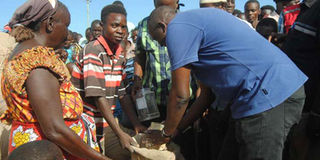Kenyans' right to be free from hunger is being violated

Gideon Mung'aro (in blue shirt), the Member of Parliament for Kilifi North, supplies relief food to residents of Mrima wa Ndege in Ganze on October 31, 2016. PHOTO | CHARLES LWANGA | NATION MEDIA GROUP
What you need to know:
It is the government’s obligation to respect, protect, and fulfil the citizens’ right to food.
The government should ensure that people have access to food or the resources that enable them to obtain food.
In the past few weeks the impact of drought has been felt throughout the land. The government has announced that more than 1.3 million people were in urgent need of food.
This prompted it to form a committee composed of officials from the National Treasury and the ministries of Devolution, Health, Education, Agriculture, Environment, and Water to handle the crisis. Now that the rains are here, does the hunger cease to exist?
Kenya has been consistently rated as a food-insecure country. The Food and Agriculture Organisation in 1996 defined food security as “a situation in which all people at all times have physical and economic access to sufficient, safe, and nutritious food which meets their dietary needs and food preferences for an active and healthy life”.
So, whereas episodic hunger brought about mainly by natural calamities such as the recent drought hits the national headlines and mobilises expedient action from the political types, chronic hunger remains a key challenge requiring similar, if not greater, attention.
In Kenya, it is estimated that more than 10 million people suffer from chronic food insecurity and poor nutrition. It means that men, women, the elderly, and the youth go hungry for hours every day, over a significant period of time and are constantly undernourished due to lack of sufficient and quality food.
PHYSIOLOGICAL NEEDS
They do not consume enough calories to provide them with energy to enable them to meet their minimum physiological needs. They do not get the levels of protein and micronutrients such as vitamins or other critical components in their food.
Their diet mainly consists of cereals (maize, millet, sorghum, or rice) accompanied by green vegetables. They may occasionally eat potatoes, cassava, sweet potatoes, and pulses, but their diet is severely lacking in other food groups such as meat, eggs, fish, dairy, and fruits, mainly because of cost.
The impact of chronic hunger on vulnerable groups such as pregnant women and children is particularly dire. Malnourished women are more likely to fall ill.
There is also a greater chance that their newborns will be underdeveloped, resulting in higher levels of infant mortality. Newborns that survive have low immunity and often fall ill, further burdening poor families with medical expenses.
Additionally, poor nutrition in children results in stunted growth and reduced learning ability.
Taken together, this means that there are too many Kenyans who face considerable odds as they start off their lives, making success in later life a near impossibility.
Who is chronically food-insecure in Kenya? The highest prevalence is among the rural poor, especially those in the arid and semi-arid lands, the urban poor, especially in Nairobi county, households headed by poorly educated women and the elderly, small-scale farmers, and the unemployed.
NEGATIVE STRATEGIES
When confronted with threats of lack of food, those who suffer from chronic hunger resort to negative coping strategies such as reducing the number of meals they eat, the quantity of food, as well as the variety and quality of food.
In a cruel twist of fate, when famine strikes, the chronically hungry are exceptionally vulnerable because they have fewer resources to protect themselves and their families as they are already living on the margin of survival.
Ironically, our Constitution’s Article 43 grants every citizen “the right to be free from hunger and to have adequate food of acceptable quality”. The chronic food insecurity that is endured by Kenyans is, therefore, a violation of their right to food.
It is the government’s obligation to respect, protect, and fulfil the citizens’ right to food. The government should ensure that people have access to food or the resources that enable them to obtain food.
As the 2017 elections approach, it is time the Kenyan voter demanded an end to routine hunger in the country. It is embarrassing that after 53 years of independence our citizens are still malnourished, yet billions in public funds are lost every year to corruption.
Voters should only consider candidates who present viable proposals to ensure that the right to food in this country is guaranteed.
Muthoni Njenga is a communication consultant.




